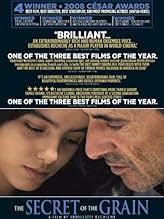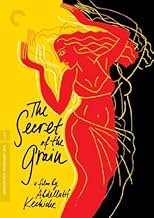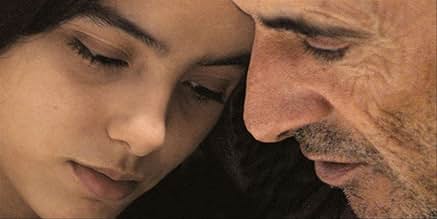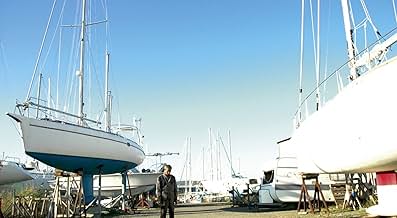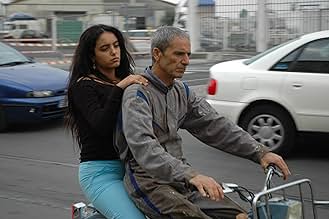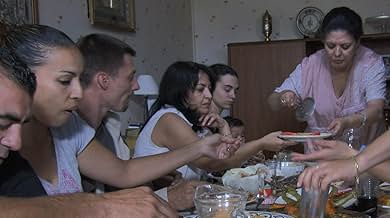AVALIAÇÃO DA IMDb
7,4/10
8,1 mil
SUA AVALIAÇÃO
No sul da França, um trabalhador dos estaleiros navais franco-árabes e a filha de seu parceiro perseguem o sonho de abrir um restaurante.No sul da França, um trabalhador dos estaleiros navais franco-árabes e a filha de seu parceiro perseguem o sonho de abrir um restaurante.No sul da França, um trabalhador dos estaleiros navais franco-árabes e a filha de seu parceiro perseguem o sonho de abrir um restaurante.
- Direção
- Roteiristas
- Artistas
- Prêmios
- 19 vitórias e 9 indicações no total
Nadia Taoul
- Sarah
- (as Nadia Taouil)
- Direção
- Roteiristas
- Elenco e equipe completos
- Produção, bilheteria e muito mais no IMDbPro
Avaliações em destaque
Abdel Kechiche's tragicomedy is a film of contradictions and contrasts. It is both quiet and boisterous, with a script that is both understated and energetic, and which explores (among other things) how communities both accept immigrants, and yet remain suspicious of them.
Couscous follows sixty-something Slimane Beiji, a Tunisian-French shipyard worker in the French port town of Sète, played with reserved dignity by Habib Boufares. Despite being divorced, Slimane still spends a lot of time with his ex-wife and their extended family. The rest of his time is spent with his girlfriend and her daughter, who own a quayside hotel.
When Slimane is laid off, it comes as the last straw in a life that has become increasingly redundant. Left with nothing to lose, he hits upon the idea of opening a restaurant on an old boat. The project becomes a focal point for Slimane's extended family: his sons lend a hand with the boat's renovation; his girlfriend's daughter helps acquiring the necessary bank loans and official documents; and his ex-wife will cook the restaurants signature dish the eponymous couscous.
The restaurant works as a symbol of the hopes and dreams of immigrants how all they want is to integrate and work in their new community, whilst still retaining the culture and customs of their homeland. But it also signifies the duality of a community's attitude toward immigrants. During a party thrown to promote Slimane's restaurant, the guests all compliment their host and try their hand at a little Arabic; and yet, when Slimane's back is turned, they whisper amongst themselves that "he's not from around here." But Couscous really shines in its extended scenes of dialogue. At several points during the film we join Slimane and his family as they sit in kitchens or dining rooms and do nothing but talk. And it is a joy to watch. The script shows an eye for authentic dialogue, meandering through topics as diverse as racism in the workplace, the extortionate price of nappies, and using Arabic in the bedroom. The genuine performances from the supporting cast draw us further into these scenes, and the cinematography keeps us there. The camera squeezes between family members, getting the kind of intimate close-ups that give a real impression of a loud family dinner.
This light-hearted attitude, present in the early scenes, contrasts with a grimmer final third, in which situations get progressively worse. And as things get worse, family relationships start to break down.
This also reveals the film's ultimate irony. Slimane's family is a close-knit unit when the members each live separate lives. But when the restaurant brings them together, family unity dissolves and they resort to serious bickering.
Couscous follows sixty-something Slimane Beiji, a Tunisian-French shipyard worker in the French port town of Sète, played with reserved dignity by Habib Boufares. Despite being divorced, Slimane still spends a lot of time with his ex-wife and their extended family. The rest of his time is spent with his girlfriend and her daughter, who own a quayside hotel.
When Slimane is laid off, it comes as the last straw in a life that has become increasingly redundant. Left with nothing to lose, he hits upon the idea of opening a restaurant on an old boat. The project becomes a focal point for Slimane's extended family: his sons lend a hand with the boat's renovation; his girlfriend's daughter helps acquiring the necessary bank loans and official documents; and his ex-wife will cook the restaurants signature dish the eponymous couscous.
The restaurant works as a symbol of the hopes and dreams of immigrants how all they want is to integrate and work in their new community, whilst still retaining the culture and customs of their homeland. But it also signifies the duality of a community's attitude toward immigrants. During a party thrown to promote Slimane's restaurant, the guests all compliment their host and try their hand at a little Arabic; and yet, when Slimane's back is turned, they whisper amongst themselves that "he's not from around here." But Couscous really shines in its extended scenes of dialogue. At several points during the film we join Slimane and his family as they sit in kitchens or dining rooms and do nothing but talk. And it is a joy to watch. The script shows an eye for authentic dialogue, meandering through topics as diverse as racism in the workplace, the extortionate price of nappies, and using Arabic in the bedroom. The genuine performances from the supporting cast draw us further into these scenes, and the cinematography keeps us there. The camera squeezes between family members, getting the kind of intimate close-ups that give a real impression of a loud family dinner.
This light-hearted attitude, present in the early scenes, contrasts with a grimmer final third, in which situations get progressively worse. And as things get worse, family relationships start to break down.
This also reveals the film's ultimate irony. Slimane's family is a close-knit unit when the members each live separate lives. But when the restaurant brings them together, family unity dissolves and they resort to serious bickering.
In his sixties, Slimane (Habib Boufares) is a disillusioned and tired man and, since his divorce from his wife, he has become a kind of free electron within his microcosm reduced to a community from North Africa. After an abrupt dismissal from the shipyard of the port of Sète, he quickly and naturally feels a sense of uselessness until having the unexpected idea and the strong desire to open a couscous restaurant, on a boat destined to scrap. His whole universe (family and friends) will progressively weld around this project which has become for everyone the symbol of a quest for a better life.
The director Abdellatif Kechiche is a perfectionist and creates with O Segredo do Grão (2007) a film of atmosphere. It obviously takes time to describe the environment, the characters, the relationships between them, the issues, ... and thus allow the audience to immerse themselves in a universe that is not necessarily his (mine in all case): this is also the magic of cinema. Thus, the pace is deliberately slow, even very slow, with some scenes that may seem disproportionately long or even unnecessary. Nevertheless, from the beginning to the end, I was in total empathy with this Slimane.
As a synthesis: a movie as endearing as moving, as poignant as revitalizing. 7/8 of 10
The director Abdellatif Kechiche is a perfectionist and creates with O Segredo do Grão (2007) a film of atmosphere. It obviously takes time to describe the environment, the characters, the relationships between them, the issues, ... and thus allow the audience to immerse themselves in a universe that is not necessarily his (mine in all case): this is also the magic of cinema. Thus, the pace is deliberately slow, even very slow, with some scenes that may seem disproportionately long or even unnecessary. Nevertheless, from the beginning to the end, I was in total empathy with this Slimane.
As a synthesis: a movie as endearing as moving, as poignant as revitalizing. 7/8 of 10
Diane and I attended this wonderful film in Fremantle this morning and both of us left the theater at its conclusion realising that we had seen an unusual film from an unusual ethnic angle and that the director and actors had completed a superb work.
I adore our Australian films because many of them explore the mundane drama of quiet ordinary life and this film is no exception even though it is French rather than Australian. I guess Hollywood does not believe viewers are sensitive enough to pay to see domestic drama and that the subject matter must always be "bigger than Ben Hurr" but our movies as well as many European movies have proved that the examination of quiet aspects of everyday life can provide extremely compelling material for contemporary films.
IMDb commentators found it off-putting to watch long film sequences about potty training, marital squabbles and restaurant scenes; however, this is the stuff of myriad similar domestic situations that we are all familiar with. The genius being that the director can make these scenes rich enough to watch. Diane and I both believe he did this admirably as well as providing much to discuss and reflect upon later.
We both found it different and endearing that we were allowed into the lives of people and their situations that would be closed to us without this delightful film. Yes, I used the adjective "delightful"; the scenes of domesticity were enlightening and compellingly endearing because we are inundated with Western examples of the genre but few (such as in this film) of other ethnic examples.
A film that should not be missed!
I adore our Australian films because many of them explore the mundane drama of quiet ordinary life and this film is no exception even though it is French rather than Australian. I guess Hollywood does not believe viewers are sensitive enough to pay to see domestic drama and that the subject matter must always be "bigger than Ben Hurr" but our movies as well as many European movies have proved that the examination of quiet aspects of everyday life can provide extremely compelling material for contemporary films.
IMDb commentators found it off-putting to watch long film sequences about potty training, marital squabbles and restaurant scenes; however, this is the stuff of myriad similar domestic situations that we are all familiar with. The genius being that the director can make these scenes rich enough to watch. Diane and I both believe he did this admirably as well as providing much to discuss and reflect upon later.
We both found it different and endearing that we were allowed into the lives of people and their situations that would be closed to us without this delightful film. Yes, I used the adjective "delightful"; the scenes of domesticity were enlightening and compellingly endearing because we are inundated with Western examples of the genre but few (such as in this film) of other ethnic examples.
A film that should not be missed!
10jean-no
Abdellatif Kechiche did very well with his previous movie "L'Esquive". But here we have even better. The story is simple : I'd say it is mostly about dignity, sacrifice and family love. The acting is brilliant. Habib Boufares is perfect, the young Hafsia Herzi is astounding, especially for the end of the movie. The actors are mostly non-professional people but the script is very well written and the characters are well defined, so this "amateurism" does great and helps the audience's immersion. The cinematography is very special (but never disturbing), with a lot of very close close-ups. The camera is "natural" as with Casavettes, but not "drunk", it is not a pain to watch and you don't get sea sick. The whole movie reminded me the Italian neo-realism and also a little of Renoir. Some people mention Pialat. It's a quite long movie but you don't feel it while watching, you just realize it after.
Abdellatif Kechiche, who is also an actor, stands with Turkish-German director Faith Akim as the preeminent director dealing with diaspora experience in western Europe. He was born in Tunisia but was brought to France at the age of six and grew up in Nice. 'La graine et le mulet,' the title, refers to (mullet) fish couscous (grain) and Kechiche has said he's as stubborn as the mullet. The action is in the southern French port town of Sète. Most of the cast are non-actors.
Though marred by a jittery camera in intimate scenes, over-close closeups, and some sequences that are allowed to run too long, 'The Secret of the Grain' is nonetheless a triumph, an emotionally powerful, overwhelmingly rich, epic-feeling tragi-comedy that overflows with wonderful performances, evokes a host of masters including Jean Renoir and the Italian neorealists, and fairly bursts off the screen with its loving and complex portraits of Magreban society in France and the harsh world in which it struggles and survives. The main focus for all this is food: two grand meals, one intimate and familial, the other in a projected couscous restaurant on an old boat where friends and family and local officials are all invited to show off cuisine and entertainment in an effort to prove that an old man at the end of his tether can, with the help of his family and friends, make a go of it in a new business, against all odds. Kechiche and his cast focus not so much on any plot-line arc, though there are dramatic turns of events right up to the end, but on the way they work as an ensemble to make each moment come alive. In the somewhat stilted, over-polished and over-sophisticated and often dry world of French cinema, it's not hard to see how the rough, irresistible energy of the world Kechiche brings to the screen here would seem a welcome tonic. And, it has to be admitted, giving the same very gifted Arab director the run of the Césars twice can't help but be soothing to the consciences of the left-liberal intellectuals who tend to dominate the world of French film criticism. It doesn't hurt that 'Secret' is offered by Pathé and has the imprimatur of the prestigious producer Claude Berri.
Kechiche's previous (and second) film 'L'Esquive' ("The Avoidance"), retitled in English 'Games of Love and Chance' (after the 18th-century playwright Marivaux's work which is central to the plot) which won four Césars, including Best Director and Best Film, was about the young mixed population of children of immigrants who live in the ghetto-like suburban Paris 'banlieue.' This new story is a homage to the "fathers," the generation of Kechicne's parents, who immigrated to France forty or fifty years ago.
Hence the protagonist is the sad but determined Slimane Beiji (Habib Boufares), who as the movie begins is told by his boss at the port shipyard workshop that, now sixty-one, he is no longer "rentable" (profitable), his work is too slow, he doesn't keep up with the schedule on projects. Threatened with no benefits because earlier in his 35 years at the site he was off the books and now offered only half-time status, he quits. He lives in a room in a little hotel run by his lover, Latifa (Hatika Karaoui), whose daughter Rhn (Hafsia Herzi) considers Slimane her own dad and defends him against his mean sons by his ex-wife Souad (Bouraouia Marzouk). He owes her alimony, but brings fish instead. The sons say he ought to go back to the 'bled,' the old country; they want to be rid of him.
Slimane's eldest son Hamid (Abdelhamid Aktouche) is married to a Russian woman. His family evidently know about his philandering and especially his affair with the deputy mayor's wife--the need to conceal which becomes a plot pivot-point.
While Slimane is alone in his little hotel room Souad has a big fish couscous dinner with their offspring and their French husbands and children. This sequence is irritating at times for its clamorous, shifting closeups and its cacophonous talk, but at the same time the way this lively, tumultuous gathering in close quarters has been shot is a tour-de-force of complex naturalism. When the sons bring Slimane a dish of the fish couscous, he gets the idea of enlisting his ex-wife to be the cook in a restaurant he might establish in an abandoned ship. Rhm goes with him to the bank and city offices to present the project where they're politely received, but not given the green light. This is where the idea comes to give a grand dinner on the ship to convince everyone Slimane and company can make a go of it. A lot of the second half of the movie consists of this dinner.
The naturalism of the sequence may be suggested by the fact that Bouraouia Marzouk actually did a lot of the cooking for 100 people for the dinner. The theft of Slimane's Moubylette is a conscious homage to De Sica's 'Bicycle Thief' ('Ladri di biciclette'). 'La graine et le mulet' is a thrilling, amusing, moving, excruciating screen experience that takes Abdellatif Kechiche to a new level of accomplishment, but the vagaries of his methods will continue to create enemies as well as admirers as he goes along. As Jacques Mandelbaum wrote in 'Le Monde,' 'The Secret of the Grain' "mixes romance and social chronicle, melodrama and comedy, the triviality of the everyday and the grandeur of tragedy. A simple family meal becomes a classic sequence, a table of old immigrants becomes a Greek chorus, a belly dance a high point of erotic vibration and dramatic tension." For all its flaws, this movie packs a huge wallop and brings Adbellatif Kechiche to the brink of greatness.
Though marred by a jittery camera in intimate scenes, over-close closeups, and some sequences that are allowed to run too long, 'The Secret of the Grain' is nonetheless a triumph, an emotionally powerful, overwhelmingly rich, epic-feeling tragi-comedy that overflows with wonderful performances, evokes a host of masters including Jean Renoir and the Italian neorealists, and fairly bursts off the screen with its loving and complex portraits of Magreban society in France and the harsh world in which it struggles and survives. The main focus for all this is food: two grand meals, one intimate and familial, the other in a projected couscous restaurant on an old boat where friends and family and local officials are all invited to show off cuisine and entertainment in an effort to prove that an old man at the end of his tether can, with the help of his family and friends, make a go of it in a new business, against all odds. Kechiche and his cast focus not so much on any plot-line arc, though there are dramatic turns of events right up to the end, but on the way they work as an ensemble to make each moment come alive. In the somewhat stilted, over-polished and over-sophisticated and often dry world of French cinema, it's not hard to see how the rough, irresistible energy of the world Kechiche brings to the screen here would seem a welcome tonic. And, it has to be admitted, giving the same very gifted Arab director the run of the Césars twice can't help but be soothing to the consciences of the left-liberal intellectuals who tend to dominate the world of French film criticism. It doesn't hurt that 'Secret' is offered by Pathé and has the imprimatur of the prestigious producer Claude Berri.
Kechiche's previous (and second) film 'L'Esquive' ("The Avoidance"), retitled in English 'Games of Love and Chance' (after the 18th-century playwright Marivaux's work which is central to the plot) which won four Césars, including Best Director and Best Film, was about the young mixed population of children of immigrants who live in the ghetto-like suburban Paris 'banlieue.' This new story is a homage to the "fathers," the generation of Kechicne's parents, who immigrated to France forty or fifty years ago.
Hence the protagonist is the sad but determined Slimane Beiji (Habib Boufares), who as the movie begins is told by his boss at the port shipyard workshop that, now sixty-one, he is no longer "rentable" (profitable), his work is too slow, he doesn't keep up with the schedule on projects. Threatened with no benefits because earlier in his 35 years at the site he was off the books and now offered only half-time status, he quits. He lives in a room in a little hotel run by his lover, Latifa (Hatika Karaoui), whose daughter Rhn (Hafsia Herzi) considers Slimane her own dad and defends him against his mean sons by his ex-wife Souad (Bouraouia Marzouk). He owes her alimony, but brings fish instead. The sons say he ought to go back to the 'bled,' the old country; they want to be rid of him.
Slimane's eldest son Hamid (Abdelhamid Aktouche) is married to a Russian woman. His family evidently know about his philandering and especially his affair with the deputy mayor's wife--the need to conceal which becomes a plot pivot-point.
While Slimane is alone in his little hotel room Souad has a big fish couscous dinner with their offspring and their French husbands and children. This sequence is irritating at times for its clamorous, shifting closeups and its cacophonous talk, but at the same time the way this lively, tumultuous gathering in close quarters has been shot is a tour-de-force of complex naturalism. When the sons bring Slimane a dish of the fish couscous, he gets the idea of enlisting his ex-wife to be the cook in a restaurant he might establish in an abandoned ship. Rhm goes with him to the bank and city offices to present the project where they're politely received, but not given the green light. This is where the idea comes to give a grand dinner on the ship to convince everyone Slimane and company can make a go of it. A lot of the second half of the movie consists of this dinner.
The naturalism of the sequence may be suggested by the fact that Bouraouia Marzouk actually did a lot of the cooking for 100 people for the dinner. The theft of Slimane's Moubylette is a conscious homage to De Sica's 'Bicycle Thief' ('Ladri di biciclette'). 'La graine et le mulet' is a thrilling, amusing, moving, excruciating screen experience that takes Abdellatif Kechiche to a new level of accomplishment, but the vagaries of his methods will continue to create enemies as well as admirers as he goes along. As Jacques Mandelbaum wrote in 'Le Monde,' 'The Secret of the Grain' "mixes romance and social chronicle, melodrama and comedy, the triviality of the everyday and the grandeur of tragedy. A simple family meal becomes a classic sequence, a table of old immigrants becomes a Greek chorus, a belly dance a high point of erotic vibration and dramatic tension." For all its flaws, this movie packs a huge wallop and brings Adbellatif Kechiche to the brink of greatness.
Você sabia?
- CuriosidadesShooting was supposed to start in the summer of 2005 but one of the leading actors was sick, which resulted in a major delay. Thus, filming actually started on 5 September 2005 and was still running by 16 January 2006. The set was on a boat in the port of Sète for at least six weeks from October to December 2006. Outside temperatures were very low, as opposed to what they should have been if schedule could have been held. This led the production to set up large tents near the boat with heating systems for the actors and extras to remain comfortable between takes.
- ConexõesFeatured in Maltin on Movies: Flipped (2010)
- Trilhas sonorasEl fan hob wa imane
Written by Mohamed Abdel Wahab and Hussein El Sayed
Principais escolhas
Faça login para avaliar e ver a lista de recomendações personalizadas
- How long is The Secret of the Grain?Fornecido pela Alexa
Detalhes
Bilheteria
- Faturamento bruto nos EUA e Canadá
- US$ 86.356
- Fim de semana de estreia nos EUA e Canadá
- US$ 9.850
- 28 de dez. de 2008
- Faturamento bruto mundial
- US$ 14.776.783
- Tempo de duração
- 2 h 31 min(151 min)
- Cor
- Mixagem de som
- Proporção
- 1.85 : 1
Contribua para esta página
Sugerir uma alteração ou adicionar conteúdo ausente

